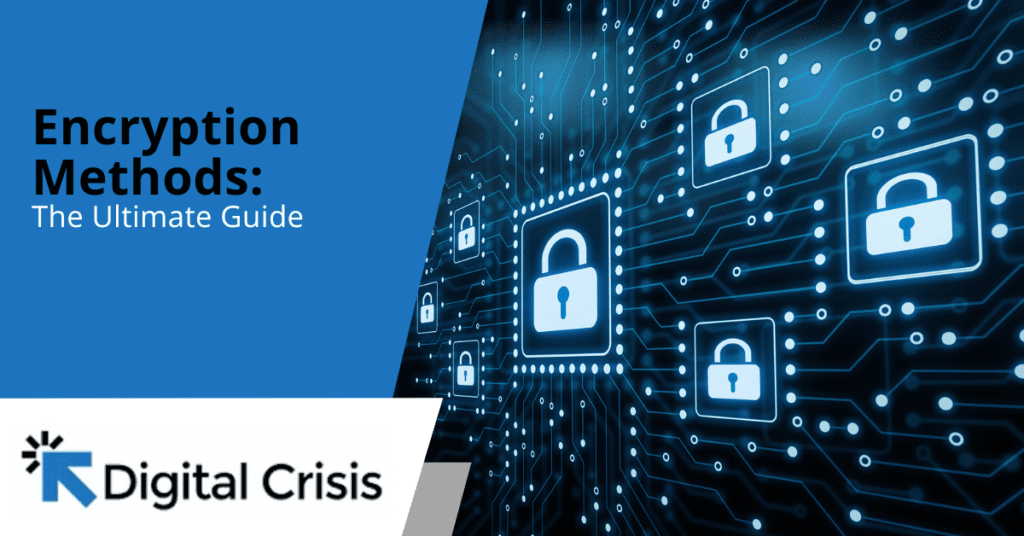Encryption Methods: The Ultimate Guide

In the modern digital era, sensitive information is best kept protected. Encryption is considered one of the most valuable tools in keeping data safe from unauthorized access. This comprehensive guide will explore some of the various encryption methods, their applications, and their importance in modern cybersecurity.
What is Encryption?
Encryption is the process of converting plain text or data into a coded form that is unreadable without the proper decryption key. It ensures that information remains confidential and secure, even if intercepted by malicious actors.
Why is Encryption Important?
Encryption is an essential measure taken to protect personal, business, and government information in these modern times of increased cyber threats. It protects data in transit and data at rest against access by unauthorized users and maintains privacy.
What are the Various Types of Encryption?
Symmetric Encryption
Symmetric encryption makes use of the same key in both encryption and decryption. This is a quick and efficient method, and hence for bulk data, this works best. Common symmetric algorithms include AES-Advanced Encryption Standard and DES-Data Encryption Standard.
Asymmetric Encryption
Also known as public-key cryptography, asymmetric encryption employs two separate keys: a public key used for encryption and a private key used for decryption. This approach offers improved security and finds widespread use in digital signatures and other secure communication protocols.
Hash Functions
Not precisely encryption, hash functions play a critical role in maintaining data integrity. They produce an output of fixed size from input data and make it practically impossible to reverse-engineer the original information.
How Does Encryption Work in Practice?
Encryption involves several steps:
- Plaintext: The original, readable data.
- Encryption Algorithm: The mathematical process used to scramble the data.
- Encryption Key: A unique value used by the algorithm to encrypt the data.
- Ciphertext: The encrypted, unreadable output.
- Decryption: The reverse process to convert ciphertext back to plaintext using the appropriate key.
What are Some Common Encryption Algorithms?
AES (Advanced Encryption Standard)
AES is one of the most widely used symmetric encryption algorithms, having a reputation for both its speed and security. It allows for key sizes of 128, 192, and 256 bits.
RSA (Rivest-Shamir-Adleman)
RSA is one of the most popular asymmetric encryption algorithms, widely used for secure data transmission and digital signatures.
Blowfish
Blowfish is a symmetric block cipher. It is fast and flexible; it is especially useful in applications that require frequent changes in keys.
How is Encryption Used in Everyday Life?
Encryption is everywhere in modern technology, including the following:
- Secure websites: HTTPS
- Messaging applications: WhatsApp, Signal
- Virtual Private Networks: VPNs
- Online banking and e-commerce
- Wireless networks: Wi-Fi
What are the Challenges of Encryption?
While encryption offers powerful security, it also involves some challenges:
Key Management
Secure storage and management of encryption keys are critical. A lost key may irretrievably lose data.
Performance Impact
Encryption and decryption processes can be very resource-intensive, especially when dealing with large datasets or real-time applications.
Quantum Computing Threat
Quantum computing is a looming threat to current encryption methods, and quantum-resistant algorithms are being developed.
How is Encryption Evolving?
As technology evolves, so do the methods of encryption:
Homomorphic Encryption
This is an emerging technique that enables computations on encrypted data without decrypting it, opening new avenues for secure cloud computing.
Post-Quantum Cryptography
New encryption algorithms, resistant to attacks by quantum computers, are in development so that data will be secure in the long term.
Blockchain-Based Encryption
Based on the studies, blockchains can increase the benefits of encryption techniques and also key management procedures.
What are the Best Practices for Implementing Encryption?
To better leverage encryption benefits:
- Strong and updated Encryption Algorithm
- Follow proper key management practices.
- Encrypt both data while in transit as well as at rest.
- Keep updating and patching your encryption software.
- Employee education and training on why encryption matters and how it should be used.
How Can Businesses Benefit from Encryption?
The benefits of encryption for organizations are many:
- Protection of sensitive customer information
- Conformity to data protection regulations, e.g., GDPR, HIPAA
- Protection of Intellectual Property
- Building trust in customers and loyalty
- Lower chance of damage from a Data Breach
Lock Your Digital Future Securely
In an increasingly interconnected world, encryption stands as a critical defense against cyber threats. By understanding and implementing robust encryption methods, individuals and organizations can protect their valuable data and maintain privacy in the digital realm.
Digital Crisis develops encryption strategies and applies them within various businesses to best fit the customers’ needs.
Our experts can guide you through modern-day encryptions that protect sensitive information. If your desire is to find ways through which to harden cybersecurity postures, call us today for the safety of your digital assets.














